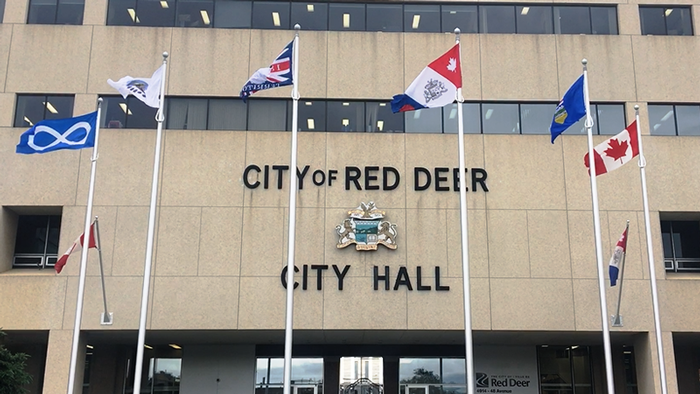Truth & Reconciliation

photo credit: rdnewsNOW staff
Central Alberta is a significant historical landscape of the ancestral territories of the Cree, Blackfoot and Métis people. It was a place to meet in peace and trade, hold ceremonies and co-exist. This area marked the crossing of the province from north to south, and was a place for traders to venture into the mountains in the west. East of Red Deer was the largest Métis Settlement west of Red River.
Red Deer’s Reconciliation Journey
The City of Red Deer honours the culture, heritage, and contributions of the First Nations, Inuit, and Métis people that have been a part of this landscape long before colonial settlement occurred. We stand with the Indigenous community in remembering the past, and look forward to affirming our relationship and partnership in actioning our local commitment to Truth and Reconciliation.
We recognize with humility that the process of Truth and Reconciliation is one that takes time. We will learn from our mistakes and pursue a mutually respectful relationship. Acknowledging the land on which we live and the truth about the history is an important beginning to this relationship.
Protocol Agreement
On June 21, 2017, Red Deer City Council and Urban Aboriginal Voices Society signed a Protocol Agreement during a ceremony in Council Chambers.
Red Deer City Council and Urban Aboriginal Voices Society Protocol Agreement (pdf)
Truth and Reconciliation Commission of Canada (TRC)
The Truth and Reconciliation Commission of Canada (TRC) was established in 2008. Truth and Reconciliation is a process of healing relationships, sharing truths, listening to the knowledge that is being shared, and doing our part to redress past harms. It is taking the time to build and maintain mutually respectful relationships. Truth and Reconciliation is about learning the history and legacy of residential schools, and the many contributions Aboriginal peoples have made, and continue to make to Canadian society. Indigenous children in Canada were removed from their families for over 100 years and sent to institutions known as residential schools. The Red Deer Indian Industrial School operated from 1893–1919, located 5 kilometres west of Red Deer. The Survivors Speak - A Report of the Truth and Reconciliation Commission of Canada
More information and resources
A large part of Truth and Reconciliation is a commitment to respectful learning. Learning is a journey, it doesn’t happen overnight, and sometimes it’s hard to find a place to start. These resources are provided for those seeking to learn more about Canada’s Indigenous history and our journey toward reconciliation.
- Red Dress Day – May 5
- Moose Hide Campaign - May 16, 2024
- Remembering the Children Day – June 11
- National Indigenous Peoples’ Day – June 21
- National Day for Truth & Reconciliation (Orange Shirt Day) – September 30
- Orange Ribbon Campaign - September
- Metis Week - Week of Louis Riel Day (November 16)
Details about local events, celebrations and ceremonies, including Pow Wows and community feasts, may be found on the Red Deer Community Events Calendar (RedDeerEvents.ca).
- Métis Nation of Alberta: Since 1928, the Otipemisiwak Métis Government has governed the Métis within Alberta. (Oh-teh-pim-swak: The people who own themselves)
- Indian Residential School Survivors Society: Provides essential services to residential school Survivors and families experiencing intergenerational trauma.
- The National Indian Residential School Crisis Line provides 24-hour crisis support to former Indian Residential School students and their families toll-free at 1-866-925-4419.
- National Centre for Truth and Reconciliation: A place of learning and dialogue where the truths of the residential school experience will be honoured and kept safe for future generations.
- ReconciliACTION: The 6 actions of ReconciliACTION can be applied to any of the Calls to Action or even beyond them. Take some time to review the steps on how to create your own ReconciliACTION Plan.
- Delivering on Truth and Reconciliation Commission Calls to Action: Government of Canada's progress in responding to the Truth and Reconciliation Commission 94 Calls to Action.
- Native Land map: Learn about Indigenous territories, treaties and languages in your area.
- Alberta Recreation & Parks Association: Walking With Indigenous Communities
- Red Deer Archives The Red Deer Indian Industrial School operated as a residential school from 1893-1919.
- Records and Reports: Understand the generational impact of other historical decisions and actions.
Kitchen Table Conversations
To celebrate Red Deer's multicultural history and support our community on the journey to Reconciliation, we produced a series of conversations between local Indigenous Knowledge Keepers and Deirdre Ashenhurst, a Community Facilitator with The City of Red Deer.
- Conversation #1 with Elder Maggie Loney - topics include protocol, how to begin engaging with an Elder or Knowledge Keeper and hugs
- Conversation #2 with Métis Knowledge Keeper Raye St. Denys - topics include sashes, jigs and what it means to be Métis
- Cree classes are available through Red Deer Native Friendship Society
- The University of Alberta free, online Indigenous Canada course
- Four Seasons of Reconciliation - a self-paced online course
- Understand the history and impact of Residential Schools
- 30 must-read books to learn about the Indigenous experience in North America
- List of Indigenous Canadian films
- Participate in days of recognition and days of celebration: Red Dress Day, Remembering the Children Day, Indigenous Peoples Day, Métis week, National Indigenous History Month, Pow Wows, Community Feasts and traditional knowledge sharing opportunities like language lessons, beading lessons, hand weaving lessons or jigging lessons. Details may be posted on the Red Deer Community Events Calendar (RedDeerEvents.ca).